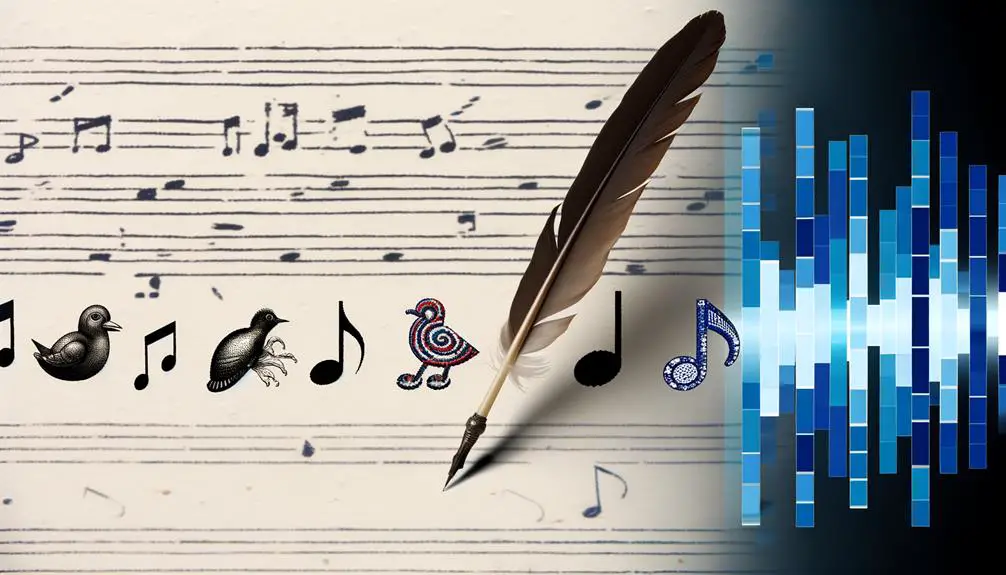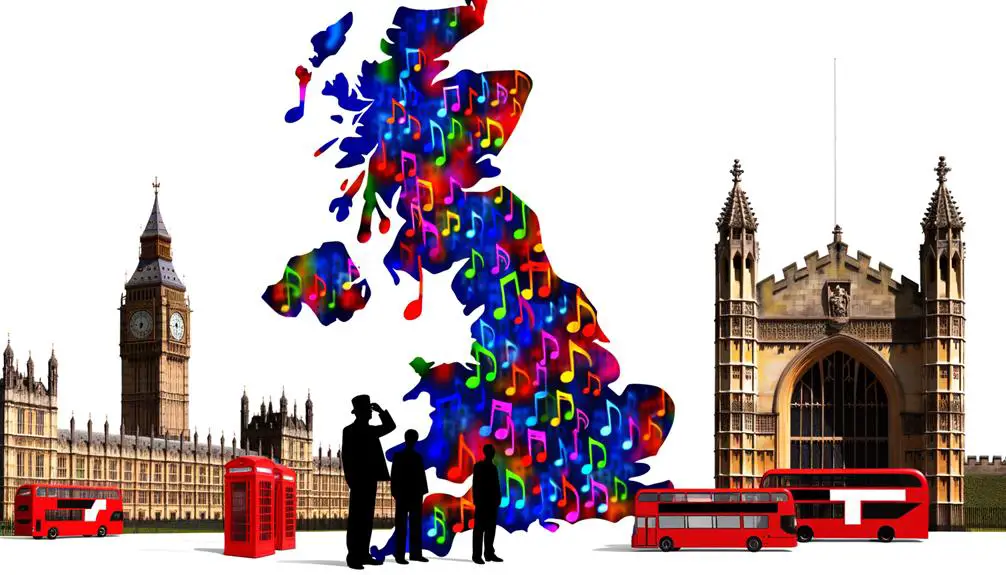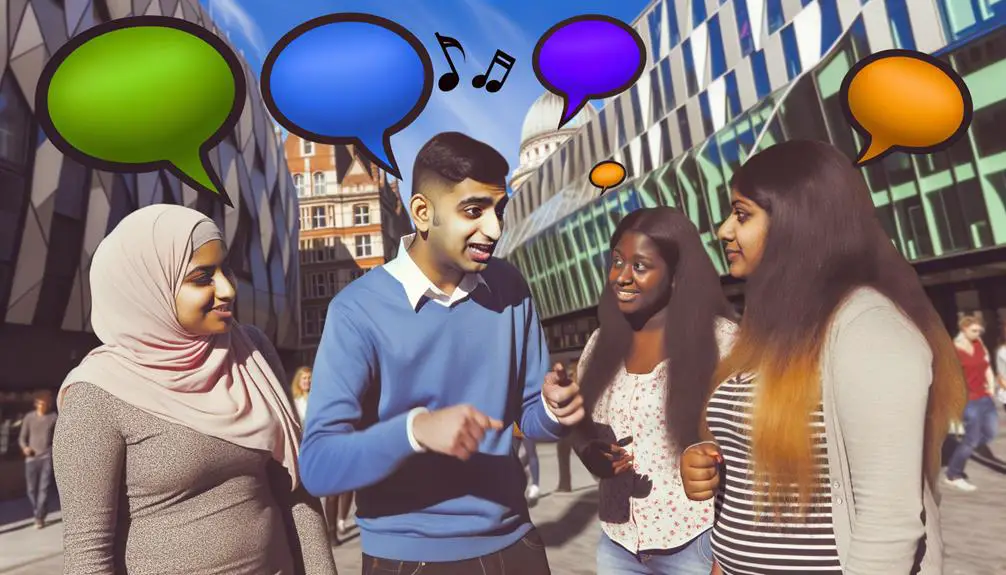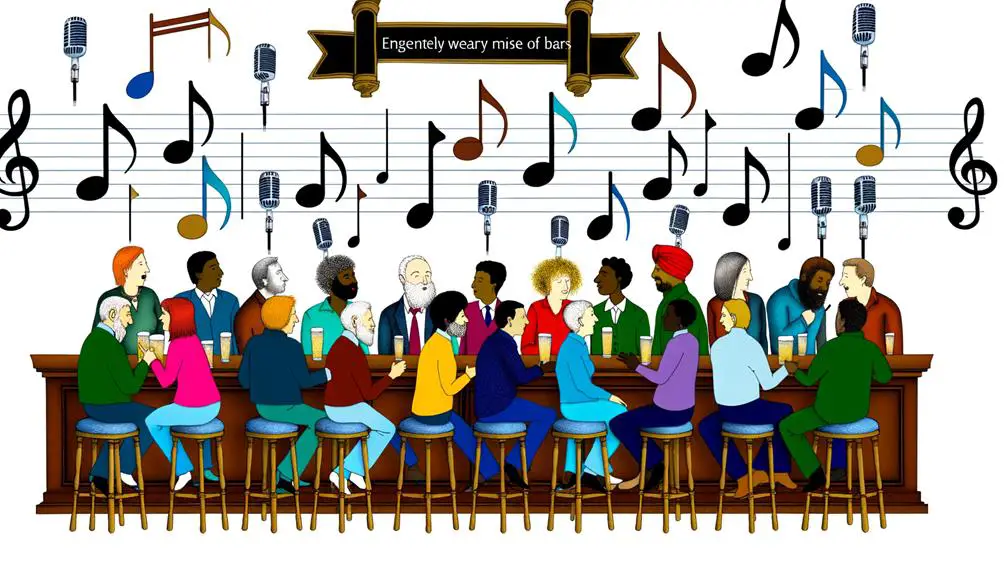In British slang, 'bars' is all about the lyrical talent in the rap and grime scenes. It's how you measure an artist's skill in crafting their lyrics, blending creativity with sharp rhyme schemes and storytelling. Originating from the US hip-hop culture, this term was embraced by British musicians, evolving to embody the distinct characteristics of the UK's music scene. It showcases an artist's ability to tell compelling stories, use innovative wordplay, and deliver their message with rhythm and flow. Understanding 'bars' within this framework opens up a deeper appreciation for the artistry involved. There's much more to explore beneath the surface of British slang's musical influence.
Key Takeaways
- In British slang, 'bars' refer to a musician's lyrical content, creativity, and skill.
- Originating from the hip-hop community, 'bars' emphasize lyrical prowess and cultural influences.
- 'Bars' are a key component in the UK's grime and rap scenes, indicating storytelling and rhyme schemes.
- The term signifies the artist's ability to craft compelling, rhythmically intricate lyrics.
- 'Bars' reflect a musician's technical skill and ability to convey messages through music.
The Origins of 'Bars'

The term 'bars' in British slang, originating from the hip-hop community, signifies a musician's lyrical prowess, seamlessly blending cultural influences and linguistic evolution. This term has deep linguistic roots, tracing back to the early days of hip-hop in the United States. As hip-hop grew in popularity, its vernacular spread globally, influencing cultures far from its American origins. In the UK, 'bars' was adopted by local musicians and fans, taking on a life of its own within the British music scene.
The dissemination of slang, including 'bars', showcases the dynamic nature of language, especially in how English adapts and evolves across different contexts. British artists have not only incorporated the term into their lexicon but have also contributed to its evolution, infusing it with local dialects and cultural nuances. This cross-pollination of linguistic and musical elements highlights the global dialogue within the hip-hop community, where words like 'bars' become a bridge between cultures.
Understanding 'bars' within the British context requires recognizing its American origins while appreciating how it's been uniquely adapted in the UK. The term's journey from American streets to British studios exemplifies the global spread of hip-hop culture and the universal language of music.
Bars in British Music
In British music, particularly within the grime scene, 'bars' signify more than just lyrics; they're a measure of an artist's lyrical prowess and creativity. The versatility of rap bars showcases a wide range of skills, from storytelling to complex rhyme schemes. Understanding freestyle culture provides insight into how artists use bars to demonstrate their quick thinking and adaptability in live performances.
Grime Scene Lyricism
One might find that in the grime scene, 'bars' refer to the potent, rhythmically intricate lyrics integral to this genre's expressive power. These bars are not just words over music; they're carefully crafted to align with complex beat patterns, creating an energetic and immersive listening experience. The grime genre, known for its raw and rapid rhythm, demands a high level of lyricism where artists showcase their skills in lyrical battles. These confrontations aren't just about outdoing one another but about demonstrating mastery over language, rhythm, and the unique ability to engage with the beat in real-time. Through these lyrical exchanges, artists push the boundaries of what can be conveyed within the constraints of grime's signature sound, making 'bars' a reflection of their artistic prowess.
Rap Versatility Display
Many British artists display an impressive range of versatility in their rap 'bars', seamlessly blending genres and cultural influences. This adaptability isn't just about changing beats or rhythms; it's rooted in lyrical complexity and flow innovation. You'll notice how they weave intricate narratives and socio-political commentary within their verses, pushing the boundaries of traditional rap. They don't just ride the beat; they reshape it, introducing elements from grime, drill, and even folk or jazz, ensuring their music resonates on a global scale. This versatility isn't just for show. It's a proof of their skill in crafting 'bars' that are as thought-provoking as they are rhythmically diverse, making British rap a constantly evolving landscape.
Freestyle Culture Insight
Exploring the world of British music, it's clear that freestyle culture profoundly influences the artistry and delivery of 'bars'. This scene thrives on the spontaneity and raw energy of impromptu performances, where artists showcase their skill in crafting clever rhyme schemes and flowing seamlessly over unpredictable beats. Beat battles serve as a critical testing ground for these musicians, challenging them to adapt their style and content in real-time, pushing the boundaries of traditional rap formats. Here, the emphasis isn't just on what's said, but how it's said, with a premium placed on originality, agility, and the ability to connect with an audience spontaneously. This environment cultivates a unique breed of artists, adept in the art of verbal gymnastics and storytelling, setting the stage for a vibrant and dynamic musical expression.
The Cultural Impact
You've seen how 'bars' in British slang resonates within the music scene, but it's also pivotal in shaping social interactions. This terminology's impact extends beyond lyrics, influencing conversations and connections in diverse settings. Let's explore how it molds the music scene and evolves social engagement, reflecting its significant cultural imprint.
Music Scene Influence
The music scene, particularly genres like grime and hip-hop, has greatly shaped the meaning and usage of 'bars' in British slang, reflecting its deep-rooted cultural resonance. This transformation isn't just about the words themselves but how they're delivered and perceived, influenced substantially by genre fusion and international collaborations. These cross-genre and cross-border partnerships have not only enriched the vocabulary but also the stylistic and thematic depth with which 'bars' are crafted and evaluated. As artists from diverse backgrounds blend their unique sounds and stories, 'bars' in British slang have evolved to embody a broader spectrum of artistic expression, echoing the global and multicultural influences that shape today's music landscape. This evolution highlights the dynamic nature of language, constantly being rewritten by its cultural context.
Social Interaction Evolution
Beyond its musical origins, 'bars' in British slang have greatly influenced how people communicate and interact within various social settings, reflecting broader cultural shifts. As you've navigated the evolving landscape of digital communication, you've likely noticed how terms like 'bars' have transcended their geographical origins, becoming part of a global lexicon. This manifestation is a clear affirmation to language globalization, where digital platforms have blurred the lines between local dialects and global trends. You're not just exchanging words; you're partaking in a cultural exchange that highlights the dynamic nature of language in the digital age. Through your interactions, whether online or offline, you're contributing to the continuous evolution of how we express creativity, wit, and identity across borders.
Crafting the Perfect Bars

In crafting the perfect bars, one must understand that it's not just about clever wordplay or rhythmic flow; it's fundamentally about conveying a compelling message that resonates. Mastering this art involves an in-depth exploration into advanced lyric writing techniques and the seamless integration of melody. You'll find that the most impactful bars are those where the lyrics not only fit the rhythm but also enhance the underlying melody, creating a memorable and engaging listening experience.
To excel, you need to balance creativity with technical prowess. Start by honing your ability to craft narratives and metaphors that speak to the listener's experiences or emotions. This connection is vital. Then, focus on melody integration. The melody should complement your lyrics, making them more potent and evocative. Understanding the basics of musical theory can greatly aid in this process, allowing you to predict how certain lyrical rhythms will interact with various melodic lines.
Bars Vs. American Rap
Often, you'll find that the distinction between bars in British slang and American rap lies not just in the accent, but in the depth and complexity of the lyrical content. While both traditions pride themselves on the skill of wordplay and the prowess of their lyrical battles, there's a nuanced difference in how they approach storytelling and the themes they explore. British rappers often weave intricate tales that reflect on societal issues, leveraging a blend of local dialects and slang to paint vivid pictures of life in the UK. This approach results in bars that are not only catchy but laden with messages that resonate deeply within their communities.
On the other side of the pond, American rap has had a profound impact on global music culture, including its influence on British rap. American influences are evident in the beats, flow, and sometimes even the themes explored in British rap. However, British artists have skillfully adapted these influences to fit their unique contexts, ensuring their bars maintain a distinct identity. This fusion has led to a rich, transatlantic exchange where lyrical battles often transcend borders, fostering a dynamic dialogue between artists from both backgrounds.
Notable British Lyricists

Several British lyricists have consistently set the standard for ingenious wordplay and profound storytelling within the rap genre, mesmerizing audiences both domestically and internationally. Their contributions aren't just mere performances; they're intricate narratives woven with lyrical influences from a vast cultural tapestry. These artists have adeptly used their platform to relay their personal experiences, societal observations, and universal truths through poetic expressions, setting them apart in a crowded scene.
The prowess of British lyricists in crafting bars that resonate on multiple levels is a reflection of their skillful blend of traditional and contemporary influences. They've taken the art of storytelling to new heights, infusing their lyrics with a depth and complexity that challenges listeners to engage on a more intellectual level. This blend of clever wordplay and rich narrative is what makes the British rap scene uniquely compelling.
Through their work, these lyricists have not only entertained but also educated their audience, highlighting the power of music as a form of communication and cultural expression. Their ability to articulate experiences, emotions, and perspectives through a combination of rhythmic patterns and lyrical dexterity underscores the transformative potential of their art.
The Evolution of Bars
How have the lyrical constructions known as 'bars' undergone transformation within the British rap scene? Initially, bars in British rap were heavily influenced by American hip-hop, mimicking its themes and styles. However, as the genre matured, artists began infusing their lyrics with distinctly British elements, showcasing a linguistic diversity that set them apart. This evolution reflects not just a change in content but also in the global interpretations of what bars can be.
To paint a picture of this evolution, consider the following table:
| Era | Characteristics |
|---|---|
| Late 90s | Heavy American influence, focus on similar themes and styles. |
| Early 2000s | Emergence of grime, a genre with faster tempos and a focus on UK urban life. |
| 2010s | Integration of multicultural London English, showcasing linguistic diversity. |
| 2020s | Global fusion, incorporating sounds and styles from music around the world. |
This trend towards embracing a broader range of influences while retaining a distinctly British core has broadened the scope of what bars can be, reflecting a more global perspective within the British rap scene.
Bars in Modern Slang

In today's lexicon, 'bars' has transcended its original musical connotations, embodying a multifaceted symbol of creativity and prowess within modern slang. This evolution reflects a broader trend in language evolution, where terms develop layers of meaning that mirror the complexities of contemporary culture. As you explore further into the nuances of 'bars' in today's vernacular, you'll notice it's not just about lyrical skill in music anymore—it's about the art of articulation, whether in music, conversation, or even in the crafting of social media captions.
This linguistic shift offers a compelling lens for slang comparison, revealing how expressions evolve to capture the zeitgeist of their times. 'Bars' now signifies a mastery of language and an ability to connect with audiences on multiple levels. It's a reflection of the dynamic nature of slang, constantly shaped by social, cultural, and technological shifts. Understanding this term's journey from a strictly musical reference to a broader indicator of verbal dexterity provides insight into how language molds and reflects our collective experiences. As 'bars' continues to evolve, it serves as a vibrant example of the ongoing dialogue between language and society.







